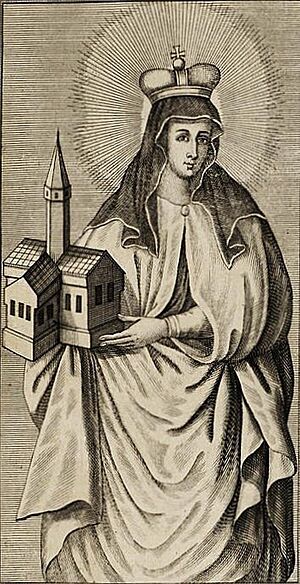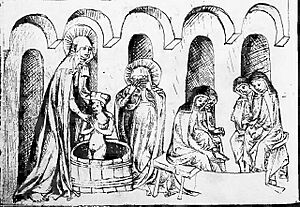Anne of Bohemia, Duchess of Silesia facts for kids
Quick facts for kids Anne of Bohemia |
|
|---|---|
 |
|
| High Duchess consort of Poland | |
| Tenure | 1238–1241 |
| Duchess of Silesia | |
| Tenure | 1238–1252 |
| Born | 1203/1204 |
| Died | 26 June 1265 (aged 60–61) |
| Spouse | Henry II the Pious |
| Issue | Constance, Duchess of Kuyavia Bolesław II the Bald Mieszko, Duke of Lubusz Henry III the White Konrad I, Duke of Silesia-Glogau Elisabeth, Duchess of Greater Poland Ladislaus of Salzburg |
| Dynasty | Přemyslid |
| Father | Ottokar I of Bohemia |
| Mother | Constance of Hungary |
Anne of Bohemia (Czech: Anna Lehnická, Polish: Anna Przemyślidka) was a powerful queen from the Přemyslid dynasty. She was born around 1203 or 1204 and passed away on June 26, 1265. Through her marriage to Henry II the Pious, she became the Duchess of Silesia and the High Duchess of Poland. This was from 1238 to 1241. Anne was especially honored by the Franciscan nuns in Wrocław. They saw her as their founder and a special helper.
Contents
Anne of Bohemia's Early Life
Anne was likely born in Prague, which was part of the Kingdom of Bohemia at the time. Her father was King Ottokar I of Bohemia. Her mother was Constance of Hungary, who was a queen. Anne's grandparents were also important rulers. Her sister, Agnes of Bohemia, later became a Franciscan nun.
Marriage and Royal Role
When Anne was about twelve years old, in 1216, she married Prince Henry II the Pious. He was a member of the Piast dynasty from Silesia. His father was Duke Henry the Bearded.
At that time, there were many political struggles in Poland. Henry the Bearded gained control of many Polish lands. In 1232, he became the ruler of Kraków, which was a very important city. When Henry the Bearded died in 1238, his son Henry II became the new ruler. Anne became the High Duchess of Poland.
Sadly, Anne became a widow just three years later. Her husband, Henry II, was killed in a big battle. This was the Battle of Legnica on April 9, 1241. He was fighting against the Mongols.
After her husband's death, Anne became a regent. This means she ruled for her young sons, especially Bolesław II Rogatka. She helped them manage the lands. However, the Silesian Piasts could not keep control of all of Poland. The throne of Kraków went to another duke.
Anne's Charitable Work
Anne was very religious and generous. In 1242, she and her son helped start a Benedictine monastery called Krzeszów.
She also gave a lot of support to the Franciscan nuns in Wrocław. She worked closely with her sister, Agnes of Bohemia, who was also a nun. In 1256, Pope Alexander IV wrote letters about Anne. He said Anne wanted to build a monastery for Franciscan nuns. This was also her husband's wish.
Construction of the monastery began in 1257. Anne gave many gifts to the nuns. But she made sure her gifts did not go against their promise of voluntary poverty. This meant the nuns could only use her gifts when they truly needed them. A special document from 1263, written by Pope Urban IV, confirms this.
A historical record, the Notæ Monialium Sanctæ Claræ Wratislaviensium, names Anne as the founder of the St Clare monastery in Wrocław. Another text about her life says that her mother-in-law, Hedwig of Silesia, greatly influenced Anne's religious journey.
Anne passed away in 1265. She was buried in the nuns' area at the Chapel of St Hedwig. This chapel was part of the St Clara of Prague Abbey in Wrocław. Some historians say she was honored as a saint in Poland, but she was never officially made a saint.
Anne of Bohemia's Children
Anne and Henry II had ten children. Here are some of them:
- Gertrude (born around 1218/20)
- Constance (born around 1221)
- Bolesław II the Bald (born around 1220/25)
- Mieszko (born around 1223/27)
- Henry III the White (born around 1227/30)
- Konrad of Głogów (born around 1228/31)
- Elizabeth (born around 1232)
- Agnes of Trebnitz (born around 1236)
- Władysław (born around 1237)
- Hedwig (born around 1238/41)
After their father's death, Anne's younger sons worked to claim their rights to the lands. Henry III became the Duke of Silesia in Wrocław. Bolesław II became the Duke of Legnica. Konrad I became the first Duke of Głogów.
Anne's son Władysław became an important church leader. He was a chancellor for King Ottokar II of Bohemia. He also became a Prince-bishop in Bamberg and Passau, and later the Prince-archbishop of Salzburg.
Among her daughters, Gertrude married Boleslav I, the Duke of Masovia. Her daughter Hedwig became the head nun (abbess) of the St Clare monastery in Wrocław.


